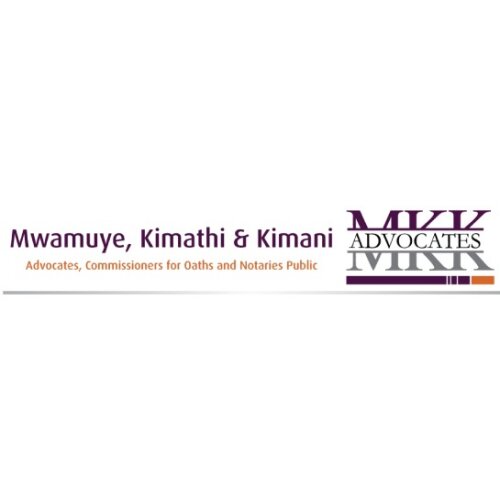Best ESG Advisory & Compliance Lawyers in Kisumu
Share your needs with us, get contacted by law firms.
Free. Takes 2 min.
List of the best lawyers in Kisumu, Kenya
About ESG Advisory & Compliance Law in Kisumu, Kenya
Environmental, Social, and Governance (ESG) Advisory and Compliance involves guiding organizations to meet legal, ethical, and sustainability standards in their operations. In Kisumu, Kenya, ESG compliance is gaining traction in both the public and private sectors. The focus is on environmental protection, social responsibility, and strong governance, reflecting both international best practices and Kenyan statutory requirements. Companies, NGOs, and even government projects are expected to follow these standards to minimize legal risks, support sustainable growth, and maintain community trust.
Why You May Need a Lawyer
Engaging a lawyer specializing in ESG Advisory and Compliance can be crucial for many reasons. Businesses may face complex regulations when planning new projects that impact the environment. Organizations hoping to secure international funding may need to demonstrate ESG compliance. NGOs working with communities or resources like Lake Victoria must ensure adherence to local and international ethical standards. Individuals and companies may also need legal help when responding to environmental impact assessments, resolving compliance audits, or facing disputes about governance practices. A lawyer ensures you understand your obligations, avoid penalties, and find practical solutions.
Local Laws Overview
In Kisumu, ESG compliance is shaped by several Kenyan laws and policies:
- The Environmental Management and Coordination Act (EMCA) governs how businesses and organizations interact with the environment, including requirements for Environmental Impact Assessments (EIAs).
- Labor laws, such as the Employment Act, address social components like workers' rights and workplace safety.
- Kenya's anti-corruption laws and the Companies Act guide governance standards and ethics for organizations.
- County-level bylaws may impose extra requirements, especially for development near Lake Victoria or urban improvement projects.
- National policies, such as Vision 2030 and the Sustainable Development Goals (SDGs) framework, promote overall ESG aims.
Failure to comply with these laws can lead to financial penalties, project delays, withdrawal of licenses, or reputational harm.
Frequently Asked Questions
What does ESG compliance mean for businesses in Kisumu?
ESG compliance means businesses need to operate in an environmentally sound, socially responsible, and ethically governed way, following Kenyan laws and industry guidelines. It covers everything from waste management and labor practices to financial transparency.
Are ESG requirements mandatory or optional in Kenya?
Certain ESG measures are mandatory under Kenyan law, such as environmental permits and fair labor standards. Other aspects may be voluntary but highly recommended, especially by international investors and partners.
Who enforces ESG laws and standards in Kisumu?
Several bodies oversee ESG enforcement. The National Environment Management Authority (NEMA) handles environmental compliance, while the Ministry of Labour and the Ethics and Anti-Corruption Commission address social and governance issues.
What are the penalties for non-compliance with ESG regulations?
Penalties can include fines, withdrawal of operational licenses, court action, or being barred from receiving public sector contracts and international funding.
How can I tell if my company is ESG compliant?
You can work with a lawyer or ESG advisor to conduct a compliance audit. They will assess your policies and operations against local laws and industry standards to identify gaps and recommend improvements.
What role does local government play in ESG compliance?
The Kisumu County government enforces county-specific environmental and planning bylaws and collaborates with national agencies on broader ESG standards.
Do start-ups and small businesses in Kisumu need to worry about ESG?
Yes, even small companies are subject to basic ESG requirements, especially regarding labor laws and waste management. Proactive compliance also opens doors to funding and partnerships.
Can ESG compliance improve my business’s reputation?
Absolutely. Companies with solid ESG records attract more investors, customers, and qualified employees, especially as awareness of sustainable business practices grows.
What documents are needed for ESG compliance?
Typical documentation includes Environmental Impact Assessment reports, employee contracts, anti-bribery policies, financial records, and community engagement plans.
How do I resolve a dispute related to ESG compliance?
A specialized lawyer can advise on mediation, negotiations with regulators, or court proceedings to resolve disputes efficiently and minimize disruptions to your business.
Additional Resources
Consider these resources for more guidance on ESG Advisory and Compliance in Kisumu, Kenya:
- National Environment Management Authority (NEMA) Kisumu Office
- Kisumu County Government Environmental and Urban Planning Departments
- The Kenya Association of Manufacturers for industry-specific ESG support
- Kenya Human Rights Commission for social and labor rights guidance
- The Law Society of Kenya for finding qualified ESG legal practitioners
Next Steps
If you require legal advice or support regarding ESG Advisory and Compliance in Kisumu, start by clearly identifying your issue or compliance concern. Gather all relevant documentation, such as contracts, permits, and company policies. Seek an initial consultation with a law firm or solo practitioner with experience in ESG matters. They will advise whether your case needs a legal audit, formal representation, or simply guidance on best practices. Being proactive can prevent costly disputes down the road and position your organization for sustainable growth in Kisumu and beyond.
Lawzana helps you find the best lawyers and law firms in Kisumu through a curated and pre-screened list of qualified legal professionals. Our platform offers rankings and detailed profiles of attorneys and law firms, allowing you to compare based on practice areas, including ESG Advisory & Compliance, experience, and client feedback.
Each profile includes a description of the firm's areas of practice, client reviews, team members and partners, year of establishment, spoken languages, office locations, contact information, social media presence, and any published articles or resources. Most firms on our platform speak English and are experienced in both local and international legal matters.
Get a quote from top-rated law firms in Kisumu, Kenya — quickly, securely, and without unnecessary hassle.
Disclaimer:
The information provided on this page is for general informational purposes only and does not constitute legal advice. While we strive to ensure the accuracy and relevance of the content, legal information may change over time, and interpretations of the law can vary. You should always consult with a qualified legal professional for advice specific to your situation.
We disclaim all liability for actions taken or not taken based on the content of this page. If you believe any information is incorrect or outdated, please contact us, and we will review and update it where appropriate.









